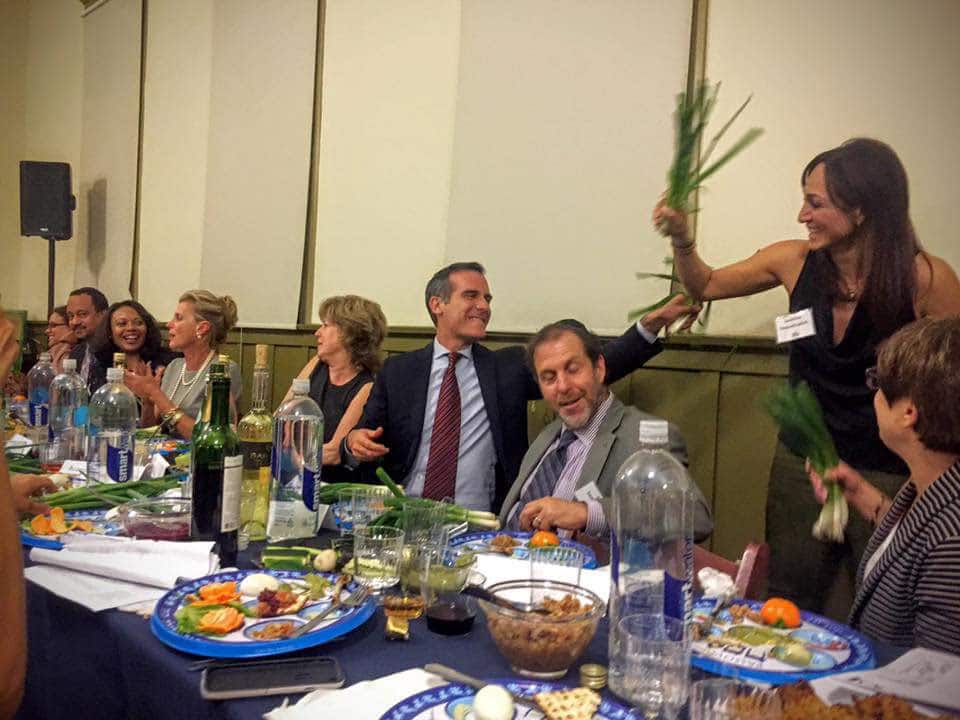 Los Angeles Mayor Eric Garcetti (center) partakes in an Iranian Jewish “Dayenu” ritual with Jasmine Youssefzadeh at a 2016 Passover seder hosted by the Jewish Federation of Greater Los Angeles at Breed Street Shul. (Credit: VIA SAM YEBRI/HAGGADOT.COM)
Los Angeles Mayor Eric Garcetti (center) partakes in an Iranian Jewish “Dayenu” ritual with Jasmine Youssefzadeh at a 2016 Passover seder hosted by the Jewish Federation of Greater Los Angeles at Breed Street Shul. (Credit: VIA SAM YEBRI/HAGGADOT.COM) Every friend, reader and mail carrier who knows me knows that I have repressed feelings of frustration about my mother. That’s why I’m a very big fan of the Passover seder.
“This is for never listening to me when I say I don’t need eleven pounds of oranges from the market!” I yell as I beat my mother’s holy head with a large, pungent scallion during the “Dayenu” recitation at the seder. “And this is for always announcing at the dinner table that my Shabbat meatballs gave you food poisoning and diarrhea!” I declare as I hit her slender arm with the tail of another scallion. “And this,” I conclude, “is for never letting me join the Girl Scouts because I had to pluck leftover feathers from chicken drumsticks on weekends!” (Our local butcher was both hurried and forgetful). The last scallion attack is always the most lethal, because I turn the allium around and hit my mother on the head with the large, heavy bulb.
Weighed down by the enormous, nearly impossible-to-fulfill Torah obligation to honor my mother, the seder is one of the few chances I have each year to act on my frustrations, all under the guise of pseudo-religious permission and fun indulgence of tradition. For some reason, at each seder, my father and a few other family members also target my mother with extra zeal.
“Give her a little whack for me, too,” the butcher said one year when I accompanied my mother to the kosher market before Pesach and she instructed him to remove the skins off of twenty chicken wings.
I imagine some rabbis and other deeply holy people are mortified to know that I take the “Dayenu” custom so seriously with regard to my mother. I really am sorry. I truly love the woman, but she’s been saying my meatballs gave her food poisoning for 15 years (if that’s the case, I don’t know why she keeps eating them).
I imagine some rabbis and other deeply holy people are mortified to know that I take the “Dayenu” custom so seriously with regard to my mother.
For years, I’ve been insisting that the Jewish people would have bid adieu to Iranian Jews if not for two privileges we enjoy, both of which are associated with Passover: First, we’re allowed to consume rice, which Ashkenazim consider chametz. And second, we whack each other mercilessly with heavy-duty scallions during the seder. If denied this privilege, most of us would have jumped ship centuries ago.
I’m kidding, of course. There’s enough beauty and wisdom in Judaism (as well as our own fierce traditionalism) to keep Iranian Jews part of the tribe. But in my defense, I really think the rice and whackings help.
The simplest explanation for the scallions is that their tails represent the terrible whips of Egyptian taskmasters, though that doesn’t explain why my uncle mimics me and beats my mother with the bulbs. Some say the tradition is meant to gently remind us never to metaphorically desire “Egypt” again. Given that most of us have been enslaved to smartphones since the first iPhone was released in 2007, I love whacking a phone out of a Passover guest’s tight, impassioned grip with one extra-large scallion (my husband and I don’t use phones and other electronics during the yomim tovim, and if we can’t watch videos of Bigfoot sightings on Instagram, neither can anyone else).
Something tells me that at some point, Iranian Jews really did want to warn fellow Jews never to be enticed by Egypt again, per the pasuk in the Torah that describes how, even when delicious manna was offered at every turn, the ancient Israelites still complained that they missed the onions of Egypt.
Yes, the onions of Egypt.
“We remember the fish that we ate in Egypt free of charge, the cucumbers, the watermelons, the leeks, the onions, and the garlic,” the Israelites said (Bamidbar 11:5-6). I can understand mouth-watering watermelon and cucumbers, but what was so terrible about non-Egyptian onions, especially if they were grown by God?
However you slice it (no pun intended), the allure of the Iranian (and Afghani Jewish) “Dayenu” tradition is hard to pass up, so much so that some non-Iranians have even taken up the custom, possibly to keep younger folks from dozing off after 45 minutes of listening to someone read from the Haggadah. I even recall hearing that our “Dayenu” ritual was incorporated into a pre-pandemic Passover seder at City Hall a few years ago, although some wondered whether that was a mild form of tokenization. I didn’t mind at all. As far as I’m concerned, whatever softens the hearts of elected officials so they don’t modify legislation that would outlaw our famously loud parties (complete with backyard DJs and valet parking) is a good thing.
Of course, no Iranian seder would be complete without the four questions — though, in my family, they’re not asked by the youngest child, but by my mother:
“Why didn’t you put out the oranges I brought you?”
“Did you ask the butcher to remove the fat off of this chicken wing on the seder plate?”
“You didn’t make meatballs for dinner, did you?”
And my personal favorite, “Are you going to write about this in The Jewish Journal?”
Tabby Refael is a Los Angeles-based writer, speaker and activist. Follow her on Twitter @RefaelTabby























 More news and opinions than at a Shabbat dinner, right in your inbox.
More news and opinions than at a Shabbat dinner, right in your inbox.